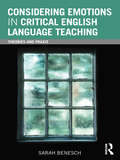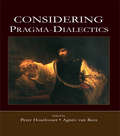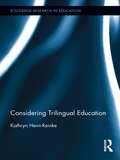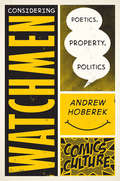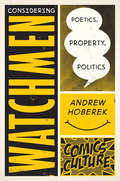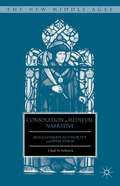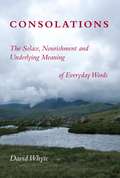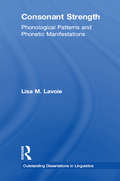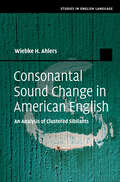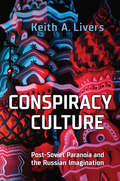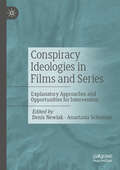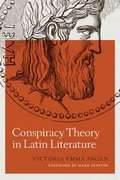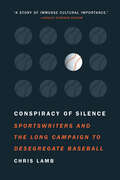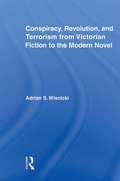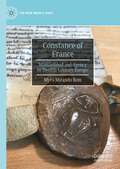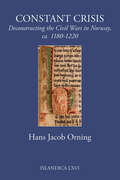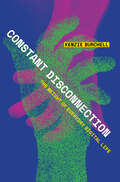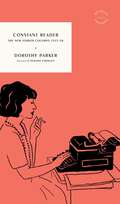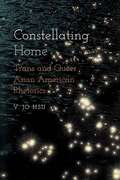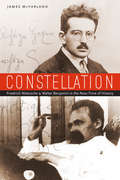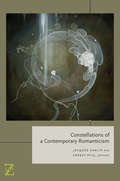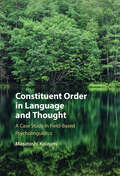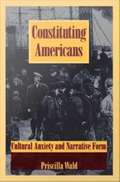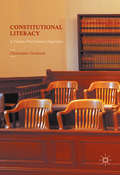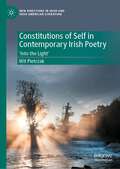- Table View
- List View
Considering Emotions in Critical English Language Teaching: Theories and Praxis
by Sarah BeneschGroundbreaking in the ways it makes new connections among emotion, critical theory, and pedagogy, this book explores the role of students’ and teachers’ emotions in college instruction, illuminating key literacy and identity issues faced by immigrant students learning English in postsecondary institutions. Offering a rich blend of, and interplay between, theory and practice, it asks: How have emotions and affect been theorized from a critical perspective, and how might these theories be applied to English language teaching and learning? What do complex and shifting emotions, such as hope, disappointment, indignation, and compassion, have to do with English language teaching and learning in the neoliberal context in public universities? How might attention to emotions lead to deeper understanding of classroom interactions and more satisfying educational experiences for English language teachers and students? These questions are addressed not just theoretically, but also practically with examples from college classes of assigned readings, student writing, and classroom talk in which various emotions came into play. Thought-provoking, accessible, and useful, this is a must-read book for scholars, students, and teachers in the field of English language teaching.
Considering Pragma-Dialectics
by Peter Houtlosser Agnès Van ReesConsidering Pragma-Dialectics honors the monumental contributions of one of the foremost international figures in current argumentation scholarship: Frans van Eemeren. The volume presents the research efforts of his colleagues and addresses how their work relates to the pragma-dialectical theory of argumentation with which van Eemeren’s name is so intimately connected. This tribute serves to highlight the varied approaches to the study of argumentation and is destined to inspire researchers to advance scholarship in the field far into the future. Replete with contributions from highly-esteemed academics in argumentation study, chapters in this volume address such topics as:*Pragma-dialectic versus epistemic theories of arguing and arguments;*Pragma-dialectics and self-advocacy in physician-patient interactions;*The pragma-dialectical analysis of the ad hominem family;*Rhetoric, dialectic, and the functions of argument; and*The semantics of reasonableness. As an exceptional volume and a fitting tribute, this work will be of interest to all argumentation scholars considering the astute insights and scholarly legacy of Frans van Eemeren.
Considering Trilingual Education (Routledge Research in Education)
by Kathryn Henn-ReinkeBased in case studies conducted in the US, Europe, and Latin America, this book explores the feasibility and benefits of trilingual/ multilingual education in the United States. Currently, there are few programs in the country of this nature, as educators tend to conclude that English-language learners would be overwhelmed by study in additional languages. Henn-Reinke builds an argument supporting trilingual education in the US, discussing issues of identity, curriculum, pedagogy, and the impact of other psycho-socio-linguistic factors.
Considering Watchmen: New edition with full color illustrations
by Andrew HoberekAlan Moore and Dave Gibbons’s Watchmen has been widely hailed as a landmark in the development of the graphic novel. It was not only aesthetically groundbreaking but also anticipated future developments in politics, literature, and intellectual property. Demonstrating a keen eye for historical detail, Considering Watchmen gives readers a new appreciation of just how radical Moore and Gibbons’s blend of gritty realism and formal experimentation was back in 1986. The book also considers Watchmen’s place in the history of the comics industry, reading the graphic novel’s playful critique of superhero marketing alongside Alan Moore’s public statements about the rights to the franchise. Andrew Hoberek examines how Moore and Gibbons engaged with the emerging discourses of neoconservatism and neoliberal capitalism, ideologies that have only become more prominent in subsequent years.Watchmen’s influences on the superhero comic and graphic novel are undeniable, but Hoberek reveals how it has also had profound effects on literature as a whole. He suggests that Watchmen not only proved that superhero comics could rise to the status of literature—it also helped to inspire a generation of writers who are redefining the boundaries of the literary, from Jonathan Lethem to Junot Díaz. Hoberek delivers insight and analysis worthy of satisfying serious readers of the genre while shedding new light on Watchmen as both an artistic accomplishment and a book of ideas. <P><P> <i>Advisory: Bookshare has learned that this book offers only partial accessibility. We have kept it in the collection because it is useful for some of our members. Benetech is actively working on projects to improve accessibility issues such as these.</i>
Considering Watchmen: Poetics, Property, Politics
by Andrew HoberekAlan Moore and Dave Gibbons's Watchmen has been widely hailed as a landmark in the development of the graphic novel. It was not only aesthetically groundbreaking but also anticipated future developments in politics, literature, and intellectual property. Demonstrating a keen eye for historical detail, Considering Watchmen gives readers a new appreciation of just how radical Moore and Gibbons's blend of gritty realism and formal experimentation was back in 1986. The book also considers Watchmen's place in the history of the comics industry, reading the graphic novel's playful critique of superhero marketing alongside Alan Moore's public statements about the rights to the franchise. Andrew Hoberek examines how Moore and Gibbons engaged with the emerging discourses of neoconservatism and neoliberal capitalism, ideologies that have only become more prominent in subsequent years. Watchmen's influences on the superhero comic and graphic novel are undeniable, but Hoberek reveals how it has also had profound effects on literature as a whole. He suggests that Watchmen not only proved that superhero comics could rise to the status of literature--it also helped to inspire a generation of writers who are redefining the boundaries of the literary, from Jonathan Lethem to Junot Díaz. Hoberek delivers insight and analysis worthy of satisfying serious readers of the genre while shedding new light on Watchmen as both an artistic accomplishment and a book of ideas.
Consolation in Medieval Narrative: Augustinian Authority and Open Form (The New Middle Ages)
by Chad D. SchrockMedieval writers such as Chaucer, Abelard, and Langland often overlaid personal story and sacred history to produce a distinct narrative form. The first of its kind, this study traces this widely used narrative tradition to Augustine's two great histories: Confessions and City of God.
Consolations: The Solace, Nourishment and Underlying Meaning of Everyday Words
by David WhyteWith the imagery of a poet and the reflection of a philosopher, David Whyte turns his attention to 52 ordinary words, each its own particular doorway into the underlying currents of human life. Beginning with Alone and closing with Work, each chapter is a meditation on meaning and context, an invitation to shift and broaden our perspectives on the inevitable vicissitudes of life: pain and joy, honesty and anger, confession and vulnerability, the experience of feeling besieged and the desire to run away from it all. Through this lens, procrastination may be a necessary ripening; hiding an act of freedom; and shyness the appropriate confusion and helplessness that accompanies the first stage of revelation. Consolations invites readers into a poetic and thoughtful consideration of words whose meaning and interpretation influence the paths we choose and the way we traverse them throughout our lives.
Consonant Strength: Phonological Patterns and Phonetic Manifestations (Outstanding Dissertations in Linguistics)
by Lisa M. LavoieThis book is a detailed examination of the phonetics and phonology of consonant strength, drawing data from parallel acoustic and articulatory studies of English and Spanish, as well as a cross linguistic survey of lenition and fortition.
Consonantal Sound Change in American English: An Analysis of Clustered Sibilants (Studies in English Language)
by Wiebke H. AhlersResearch on sound change often focuses on vowels, yet consonantal sound change also offers fascinating insights into language development and variation. This pioneering book provides a detailed investigation of consonantal sound change in English, by analyzing a large corpus of specifically designed field recordings from Austin, Texas. It offers one of the most in-depth analyses of /str/-retraction to date, drawing comparisons with studies of change in the distinguishing phonetic features of other varieties of English, and with studies of /str/-retraction in other Germanic languages. It further deepens our understanding of sound change by including qualitative data to position the sound change in the social reality of Austin, showing that specific sound changes are universally driven by age, gender and ethnicity. The results provide a testing ground for models of sociolinguistic and sound change, and highlight the importance of the social fabric of language in modeling language change.
Conspiracy Culture: Post-Soviet Paranoia and the Russian Imagination
by Keith A. LiversContemporary Russia stands apart as one of the most prolific generators of conspiracy theories and paranoid rhetoric. Conspiracy Culture traces the roots of the phenomenon within the sphere of culture and history, examining the long arc of Russian paranoia from the present moment back to earlier nineteenth-century sources, such as Dostoevsky’s anti-nihilist novel Demons. Conspiracy Culture examines the use of conspiracy tropes by contemporary Russian authors and filmmakers including the postmodernist writer Viktor Pelevin, the conservative author and pundit Aleksandr Prokhanov, and the popular director Timur Bekmambetov. It also explores paranoia as an instrument within contemporary Russian political rhetoric, as well as in pseudo-historical works. What stands out is the manner in which popular paranoia is utilized to express broadly shared fears not only of a long-standing anti-Russian conspiracy undertaken by the West, but also about the destruction of the country’s cultural and spiritual capital within this imagined "Russophobic" plot.
Conspiracy Ideologies in Films and Series: Explanatory Approaches and Opportunities for Intervention
by Denis Newiak Anastasia SchnitzerCorona as a staged instrument of oppression, secretly kept vaccination deaths or politicians drinking children's blood: at the latest since the outbreak of the Covid 19 pandemic, conspiracy ideologies are booming and harm social peace and democratic will formation through their dogmatism. So-called conspiracy theories generate systematic distrust of legitimate political institutions and can contribute to social polarization, dangerous populism and extremist escalation. Conspiracy ideologies have always been a topic in movies and television series, as they have always dealt with the relationship between reality and illusion, truth and fiction, reality and dream, sense and madness through their cinematic means. Series and films not only serve as a discursive space for social self-understanding, but also, through their complex narratives, constellations of characters and aesthetics, offer catchy explanations for the emergence and spread of conspiracy narratives. At the same time, theymake suggestions, some of them astonishingly concrete, for dealing with such collective delusions. What can we learn from the fictional worlds of series and films for dealing with this very real contemporary phenomenon?
Conspiracy Theory in Latin Literature
by Victoria Emma PaganConspiracy theory as a theoretical framework has emerged only in the last twenty years; commentators are finding it a productive way to explain the actions and thoughts of individuals and societies. In this compelling exploration of Latin literature, Pagán uses conspiracy theory to illuminate the ways that elite Romans invoked conspiracy as they navigated the hierarchies, divisions, and inequalities in their society. By seeming to uncover conspiracy everywhere, Romans could find the need to crush slave revolts, punish rivals with death or exile, dismiss women, denigrate foreigners, or view their emperors with deep suspicion. Expanding on her earlier Conspiracy Narratives in Roman History, Pagán here interprets the works of poets, satirists, historians, and orators—Juvenal, Tacitus, Suetonius, Terence, and Cicero, among others—to reveal how each writer gave voice to fictional or real actors who were engaged in intrigue and motivated by a calculating worldview. Delving into multiple genres, Pagán offers a powerful critique of how conspiracy and conspiracy theory can take hold and thrive when rumor, fear, and secrecy become routine methods of interpreting (and often distorting) past and current events. In Roman society, where knowledge about others was often lacking and stereotypes dominated, conspiracy theory explained how the world worked. The persistence of conspiracy theory, from antiquity to the present day, attests to its potency as a mechanism for confronting the frailties of the human condition.
Conspiracy of Silence: Sportswriters and the Long Campaign to Desegregate Baseball
by Chris LambThe campaign to desegregate baseball was one of the most important civil rights stories of the 1930s and 1940s. But most of white America knew nothing about this story because mainstream newspapers said little about the color line and still less about the efforts to end it. Even today, as far as most Americans know, the integration of baseball revolved around Branch Rickey&’s signing of Jackie Robinson to the Brooklyn Dodgers&’ organization in 1945. This book shows how Rickey&’s move, critical as it may have been, came after more than a decade of work by Black and left-leaning journalists to desegregate the game. Drawing on hundreds of newspaper articles and interviews with journalists, Chris Lamb reveals how differently Black and white newspapers, and Black and white America, viewed racial equality. Between 1933 and 1945, Black newspapers and the communist Daily Worker published hundreds of articles and editorials calling for an end to baseball&’s color line, while white mainstream sportswriters perpetuated the color line by participating in what their Black counterparts called a &“conspiracy of silence.&” The alternative presses&’ efforts to end baseball&’s color line, chronicled for the first time in Conspiracy of Silence, constitute one of the great untold stories of baseball—and the civil rights movement.
Conspiracy, Revolution, and Terrorism from Victorian Fiction to the Modern Novel (Literary Criticism and Cultural Theory)
by Adrian WisnickiDrawing on critical and theoretical work by Miller, Boone, Foucault, Jameson, and others, as well as cultural history, affect theory, and contemporary psychiatric literature, the author defines and explores what he calls the Victorian "conspiracy narrative tradition"--a tradition which embraces classic Victorian works like Bleak House, Great Expectations, Villette, and The Moonstone, as well as later Victorian and Edwardian novels by James, Conrad, and Chesterton, and early spy thrillers such as The Riddle of the Sands and The Thirty-Nine Steps. In reading these works as instances of a single literary tradition, the conspiracy narrative tradition, the author traces how the representation of conspiracy changes in nineteenth-century British literature and argues that many of these changes occur in response to significant Victorian-era developments, such as the European revolutions of 1848-49, the rise of British law enforcement agencies, the growth of Irish Fenian terrorism, and the fin-de-siècle waning of the British Empire. The book also explores the roles that conspiratorial indeterminacy and irony play in shaping the Victorian conspiracy narrative tradition and examines how modern works by Proust, Kafka, and Pynchon appropriate elements from Victorian conspiracy narratives. Finally, in using recent work on affect theory as well as studies of paranoia by Freud, Shapiro, and Meissner, the book traces how Victorian works fashion the paranoid subject, a discursive process that ultimately leads to the emergence of the modern fictional conspiracy theorist.
Constance of France: Womanhood and Agency in Twelfth-Century Europe (The New Middle Ages)
by Myra Miranda BomConstance of France: Womanhood and Agency in Twelfth-Century Europe is a biography of Constance of France, sister of King Louis VII of France. Myra Bom recovers Constance’s life story and puts it in its medieval context by examining the historical evidence of chronicles, charters, seal imprints and letters. The countess’s long and interesting life makes for women’s history with a large geographical scope, including France, England, Toulouse and the Latin East. It touches on many aspects of life during the Middle Ages such as birth, marriage and divorce, gender roles, experience of time, and expectation for the afterlife. Bom demonstrates how and to what extent medieval women could, and did, take control of their own lives. This book is an account of the interplay of historical context and agency.
Constant Crisis: Deconstructing the Civil Wars in Norway, ca. 1180–1220 (Islandica)
by Hans Jacob OrningConstant Crisis focuses on the culmination of struggles in the medieval Norwegian kingdom to examine whether these conflicts underscored a breakdown of society and polity or whether they created an equilibrium among factions that in fact "served to contain violence." Applying the term "constant crisis" for its deliberate "dissonance," Hans Jacob Orning observes that two properties were manifest in Norwegian political and social structures of the twelfth and thirteenth centuries: a systemic balance achieved in an environment of "endemic power struggles," and a normalization of these conflicts that made it "possible to maneuver and make plans and strategies."The kings' sagas Sverris saga and Böglunga sögur are virtually indispensable sources of information on this period of Norwegian history, and Orning relies extensively on them, as well as on other medieval sources, to depict this era and its protagonists, including the major rival armed groups (the Birchlegs and the Croziers); and among kings, bishops, and earls, the person of King Sverre himself.
Constant Disconnection: The Weight of Everyday Digital Life
by Kenzie BurchellThe weight of constant digital connection is the default condition of working life, home life, and everyday personal life – driving us to engage more with platforms than with people, a new state of constant disconnection that we cannot escape. Overflowing email inboxes, deluges of mobile phone notifications and torrents of social media posts—the flow of communication in its abundance is today's individualized interface for interpersonal and professional practices. Communication technologies and their use are both the needle and the thread of the wider social tapestry of everyday contemporary life. This ever-changing communication environment is where the neoliberal economic policies of the West and the commercial imperatives of the platform and data-mining industries meet. It is where the contradictions they produce can be felt day-to-day by citizens-turned-users. How does it feel to live at the pressure points of intersecting economic realities and why does it matter? Drawing on extensive sociological research, Burchell examines how individuals try to manage connection as participation in everyday life and how, on a larger scale, the ever-expanding knowledge, communication, and data-driven economies depend on the very pressures that result from our disparate communication needs. With so much time spent managing the pressures of our communication environment, we often overlook the way media technologies produce systemic tensions that are reshaping how we interact with each other and what we understand to be social connection today.
Constant Reader: The New Yorker Columns 1927–28 (McNally Editions)
by Dorothy ParkerDorothy Parker&’s complete weekly New Yorker column about books and people and the rigors of reviewing.When, in 1927, Dorothy Parker became a book critic for the New Yorker, she was already a legendary wit, a much-quoted member of the Algonquin Round Table, and an arbiter of literary taste. In the year that she spent as a weekly reviewer, under the rubric &“Constant Reader,&” she created what is still the most entertaining book column ever written. Parker&’s hot takes have lost none of their heat, whether she&’s taking aim at the evangelist Aimee Semple MacPherson (&“She can go on like that for hours. Can, hell—does&”), praising Hemingway&’s latest collection (&“He discards detail with magnificent lavishness&”), or dissenting from the Tao of Pooh (&“And it is that word &‘hummy,&’ my darlings, that marks the first place in The House at Pooh Corner at which Tonstant Weader Fwowed up&”). Introduced with characteristic wit and sympathy by Sloane Crosley, Constant Reader gathers the complete weekly New Yorker reviews that Parker published from October 1927 through November 1928, with gimlet-eyed appreciations of the high and low, from Isadora Duncan to Al Smith, Charles Lindbergh to Little Orphan Annie, Mussolini to Emily Post
Constellating Home: Trans and Queer Asian American Rhetorics (Intersectional Rhetorics)
by V. Jo HsuConstellating Home: Trans and Queer Asian American Rhetorics explores how race, migration, gender, and disability entwine in conceptions of deserving citizens. V. Jo Hsu explores three archives of trans and queer Asian American (QTAPI) rhetorics, considering a range of texts including oral histories, photography, personal essays, and performance showcases. To demonstrate how QTAPI use personal narrative to critique and revise the conditions of their exclusion, Hsu forwards a critical approach to storytelling, homing, which deliberately engages sites of alienation and belonging. Through a practice of diasporic listening, Hsu tracks confluences among seemingly divergent journeys and locates trans and queer Asian American experiences within broader US and global politics. <p><p>The stories at the heart of Constellating Home center the voices of trans and nonbinary people, disabled people, and others often overlooked in conceptions of US citizenry. Hsu’s analyses demonstrate the inextricability of Asian American activism from queer politics, disability activism, and racial justice, and they consider how stories network individual experiences with resonant histories and struggles. Finding unlikely intimacies among individual and communal histories, Constellating Home provides tools for fostering mutual care, revealing harmful social patterns, and orienting shared values and politics.
Constellation: Friedrich Nietzsche and Walter Benjamin in the Now-Time of History
by James McFarlandConstellation is the first extended exploration of the relationship between Walter Benjamin, the Weimar-era revolutionary cultural critic, and the radical philosopher Friedrich Nietzsche. The affinity between these noncontemporaneous thinkers serves as a limit case manifesting the precariousness and potentials of cultural transmission in a disillusioned present.In five chapters, Constellation presents the changing figure of Nietzsche as Benjamin encountered him: an inspiration to his student activism, an authority for his skeptical philology, a manifestation of his philosophical nihilism, a companion in his political exile, and ultimately a subversive collaborator in his efforts to think beyond the hopeless temporality—new and always the same—of the present moment in history.
Constellations of a Contemporary Romanticism (Lit Z)
by Jacques Khalip & Forest Pyle, editorsConstellations of a Contemporary Romanticism takes its title and point of departure from Walter Benjamin’s concept of the historical constellation, which puts both “contemporary” and “romanticism” in play as period designations and critical paradigms. Featuring fascinating and diverse contributions by an international roster of distinguished scholars working in and out of romanticism—from deconstruction to new historicism, from queer theory to postcolonial studies, from visual culture to biopolitics—this volume makes good on a central tenet of Benjamin’s conception of history: These critics “grasp the constellation” into which our “own era has formed with a definite earlier one.” Each of these essays approaches romanticism as a decisive and unexpired thought experiment that makes demands on and poses questions for our own time: What is the unlived of a contemporary romanticism? What has romanticism’s singular untimeliness bequeathed to futurity? What is romanticism’s contemporary “redemption value” for painting and politics, philosophy and film?
Constituent Order in Language and Thought: A Case Study in Field-Based Psycholinguistics
by Masatoshi KoizumiTraditionally, due to the availability of technology, psycholinguistic research has focused mainly on Western languages. However, this focus has recently shifted towards a more diverse range of languages, whose structures often throw into question many previous assumptions in syntactic theory and language processing. Based on a case study in field-based comparative psycholinguistics, this pioneering book is the first to explore the neurocognition of endangered 'object-before-subject' languages, such as Kaqchikel and Seediq. It draws on a range of methods - including linguistic fieldwork, theoretical linguistic analysis, corpus research, questionnaire surveys, behavioural experiments, eye tracking, event-related brain potentials, functional magnetic resonance imaging, and near-infrared spectroscopy – to consider preferred constituent orders in both language and thought, examining comprehension as well as production. In doing so, it highlights the importance of field-based cross-linguistic cognitive neuroscientific research in uncovering universal and language-particular aspects of the human language faculty, and the interaction between language and thought.
Constituting Americans
by Priscilla WaldEver since the founders drafted "We the People," "we" have been at pains to work out the contradictions in their formulation, to fix in words precisely what it means to be American. Constituting Americans rethinks the way that certain writers of the mid-nineteenth and early twentieth century contributed to this project; in doing so, it revises the traditional narrative of U. S. literary history, restoring an essential chapter to the story of an emerging American cultural identity. In diverse ways, very different writers--including Frederick Douglass, Herman Melville, Harriet Wilson, W. E. B. Du Bois, and Gertrude Stein--participated in the construction and dissemination of an American identity, but none was entirely at ease in the culture they all helped to define. Evident in their work is a haunting sense of their telling someone else's story, a discomfort that Priscilla Wald reads in the context of legal and political debates about citizenship and personhood that marked the emergence of the United States as a nation and a world power. From early-nineteenth-century Supreme Court cases to turn-of-the-century Jim Crow and immigration legislation, from the political speeches of Abraham Lincoln to the historical work of Woodrow Wilson, nation-builders addressed the legal, political, and historical paradoxes of American identity. Against the backdrop of their efforts, Wald shows how works such as Douglass's autobiographical narratives, Melville's Pierre, Wilson's Our Nig, Du Bois's The Souls of Black Folks, and Stein's The Making of Americans responded, through formal innovations, to the aggressive demands for literary participation in the building of that nation. The conversation that emerges among these literary works challenges the definitions and genres that largely determine not only what works are read, but also how they are read in classrooms in the United States today. Offering insight into the relationship of storytelling to national identity, Constituting Americans will compel the attention of those with an interest in American literature, American studies, and cultural studies.
Constitutional Literacy: A Twenty-First Century Imperative
by Christopher DreisbachThis book considers the status of constitutional literacy in the United States along with ways to assess and improve it. The author argues that pervasive constitutional illiteracy is a problem for both law enforcement agencies and for ordinary citizens. Based on the author's decades of teaching in law enforcement agencies around the country, this book argues for the moral and pragmatic value of constitutional literacy and its application in twenty-first century society.
Constitutions of Self in Contemporary Irish Poetry: ‘Into the Light’ (New Directions in Irish and Irish American Literature)
by Wit PietrzakConstitutions of Self in Contemporary Irish Poetry explores the figure of the lyrical self in the work of six contemporary Irish poets: Paul Muldoon, Vona Groarke, Sinéad Morrissey, Caitríona O’Reilly, Alan Gillis and Nick Laird. By focusing on the self, this study offers the first sustained exploration of what is arguably one of the most distinctive features of Irish poetry. Readings utilise the latest theories of the lyric filtered through the work of such philosophers as Jacques Derrida, Umberto Eco, Slavoj Žižek, Giorgio Agamben and Zygmunt Bauman, and connect an interdisciplinary approach with attention to the operations of the poetic text to bring out aspects of the self in Irish writing that have been given only cursory critical attention so far.
